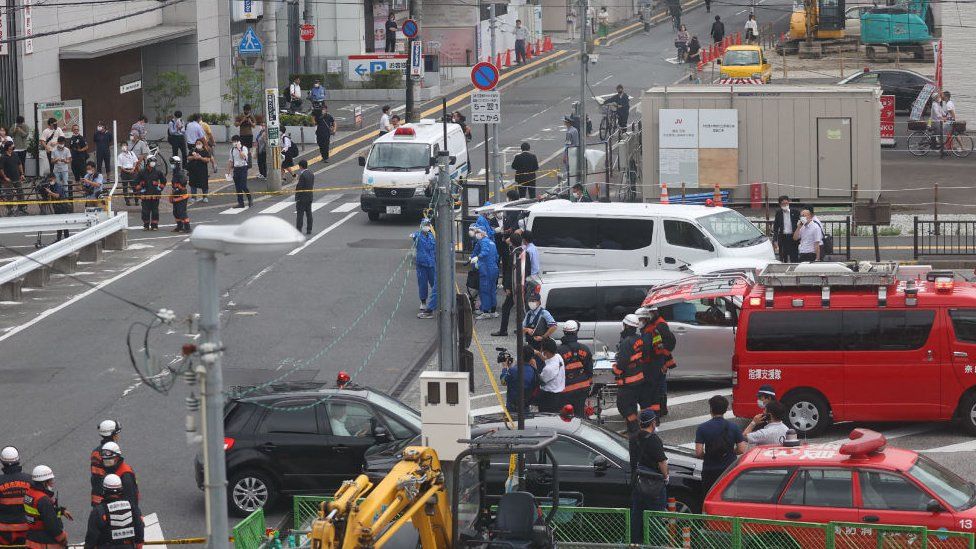Former Japanese Prime Minister Shinzo Abe has collapsed after he was shot at an event in the city of Nara.
Mr Abe was shot at twice while he was giving a speech, causing him to fall to the ground. His attacker has been arrested.
Ex-Tokyo governor Yoichi Masuzoe said in a tweet that the 67-year-old Mr Abe was in a state of cardiopulmonary arrest.
The term is often used before a death is officially confirmed in Japan.
The Fire and Disaster Management Agency confirmed that Mr Abe had a bullet wound on the right of his neck, and also suffered subcutaneous bleeding under the left part of his chest.
It is unclear if both shots hit him, or if a bullet hit him on the neck and travelled elsewhere.
"Former prime minister Abe was shot at around 11:30 local time (02:30 GMT) in Nara. One man, believed to be the shooter, has been taken into custody. The condition of former prime minister Abe is currently unknown," chief cabinet secretary Hirokazu Matsuno told reporters.
"Whatever the reason, such a barbaric act can never be tolerated, and we strongly condemn it."
Eyewitnesses see man with large gun
Videos circulating on social media, which could not be verified, appear to show paramedics huddled around Mr Abe in the middle of a street. He has now reportedly been taken to hospital.
Mr Abe was giving a stump speech for a candidate in Nara when the attack happened - eyewitnesses said they saw a man caryring what they described as a large gun and firing from behind.
He immediately fell to the ground bleeding. Security officers detained the attacker who made no attempt to run.
Local news broadcaster NHK said Mr Abe was "conscious and responsive" while being transported after the shooting, citing police sources. The broadcaster also added that police have seized the attacker's gun and identified him.
NHK added that the suspect - who has been identified as Tetsuya Yamagami - used a handmade gun. He is believed to be in his 40s and is a resident of Nara.
Local media reports say he is believed to be a former member of Japan's Maritime Self-Defense Force, the local equivalent of a navy.
The first question many people will be asking is what was the gun used and how did the shooter get hold of it?
The answer appears to be that he may have built it himself. Photographs taken as the suspect was being apprehended show what looks like an improvised, or home-made, double-barrelled shotgun.
Gun violence is very rare in Japan, and guns are extremely difficult to own. Political violence is also extremely rare.
Mr Abe did have a team of security police with him. But it appears the shooter was still able to get to within a few meters of Mr Abe without any sort of check, or barrier.
The shooting of such a prominent figure is profoundly shocking in a country that prides itself on being so safe.
Mr Abe, who was Japan's longest-serving prime minister, held office in 2006 for a year and then again from 2012 to 2020, before stepping down citing health reasons. He later revealed that he had suffered a relapse of ulcerative colitis, an intestinal disease.
While he was in office, he was known for his hawkish policies on defence and foreign policy, and has long sought to amend Japan's pacifist post-war constitution.
He also pushed for an economic policy that came to be known as "Abenomics" - built on monetary easing, fiscal stimulus and structural reforms.
He was succeeded by his close party ally Yoshihide Suga, who was later replaced by Fumio Kishida.
Incidents of gun violence are rare in Japan, where handguns are banned - and incidents of political violence are almost unheard of.
In 2014, there were just six incidents of gun deaths in Japan, as compared to 33,599 in the US. People have to undergo a strict exam and mental health tests in order to buy a gun - and even then, only shotguns and air rifles are allowed.
Prominent voices across the world have been quick to condemn the incident, with former Australian prime minister Kevin Rudd calling it an "attack on supporters of democracy".
The US ambassador to Japan Rahm Emanuel said Mr Abe had been an "outstanding leader of Japan and unwavering ally of the US", adding that the US was "praying" for his well-being.
BBC





